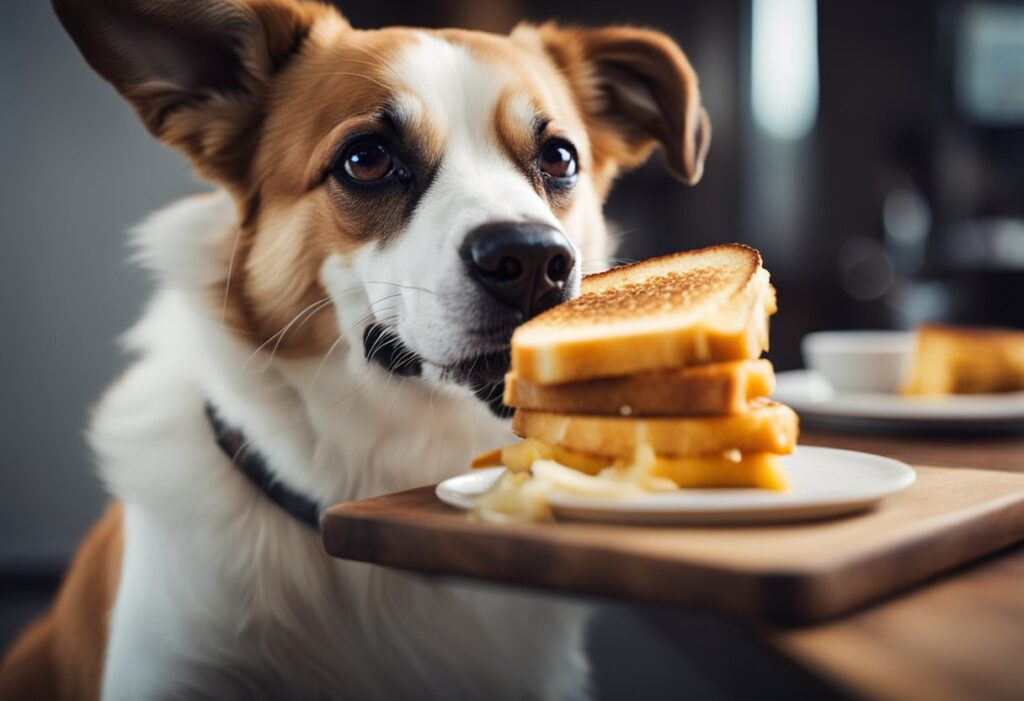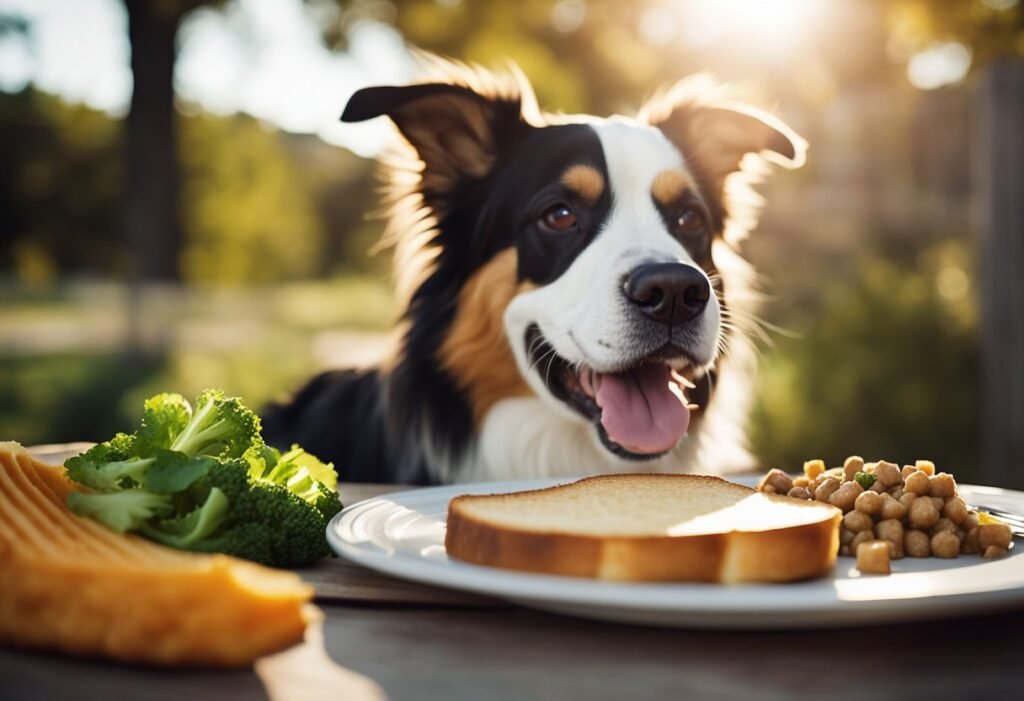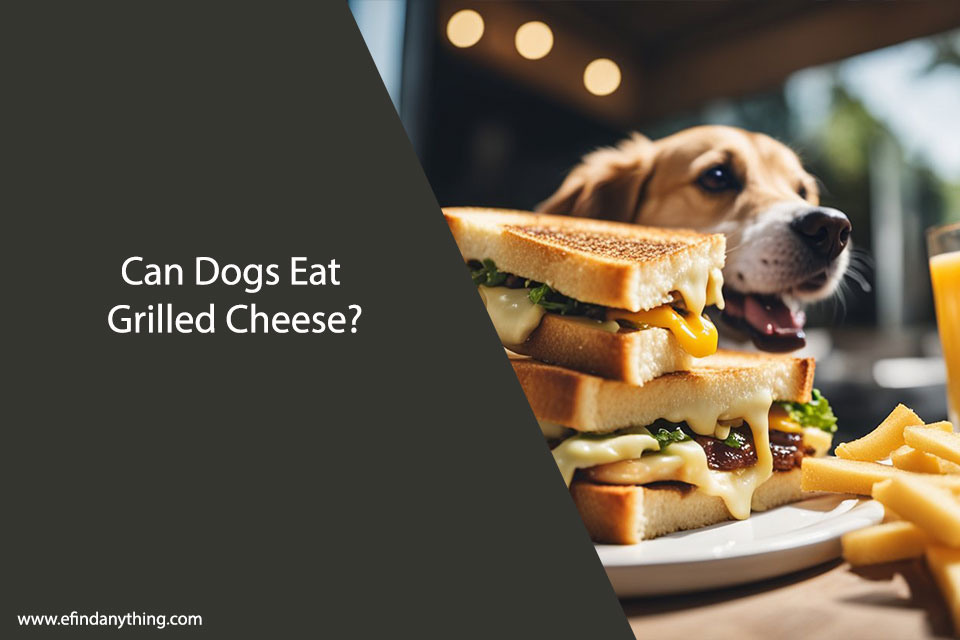Grilled cheese is a comfort food that many people enjoy. It is a simple sandwich made with bread and cheese that is toasted until the cheese is melted and gooey. However, if you are a dog owner, you may wonder if it is safe to share your grilled cheese with your furry friend. Can dogs eat grilled cheese?

Dogs have different dietary needs than humans, so it is important to be cautious about what foods you give them. While cheese can be a tasty treat for dogs, it is not suitable for all dogs. Some dogs may be lactose intolerant, which means that they cannot digest dairy products properly. This can lead to digestive upset, including diarrhea, vomiting, and gas. Therefore, it is essential to know if your dog can tolerate dairy before giving them grilled cheese.
Table of Contents
Can Dogs Eat Grilled Cheese

Grilled cheese is a popular comfort food that consists of melted cheese between two slices of bread. While it may be tempting to share this tasty treat with your furry friend, it is important to consider whether or not it is safe for them to consume.
Dogs can technically eat cheese, but it should be given in moderation as it is high in fat and calories. Grilled cheese, on the other hand, is not a recommended food for dogs. This is because it often contains additional ingredients that can be harmful or toxic to dogs.
For example, many grilled cheese recipes include garlic or onion powder, which can cause damage to a dog’s red blood cells and lead to anemia. Additionally, the bread used in grilled cheese may contain ingredients such as garlic or raisins, which can also be toxic to dogs.
It is also important to note that some dogs may be lactose intolerant and experience digestive upset after consuming dairy products like cheese. Signs of lactose intolerance in dogs may include diarrhea, vomiting, and gas.
Overall, while dogs can technically eat cheese in moderation, it is best to avoid feeding them grilled cheese or any other human foods that may contain harmful ingredients. Instead, stick to a balanced and nutritionally complete diet that is specifically formulated for your dog’s needs.
Canine Nutrition Basics

Dietary Needs of Dogs
Dogs require a balanced diet that provides them with all the necessary nutrients to maintain their health. These nutrients include proteins, fats, carbohydrates, vitamins, and minerals. Proteins are essential for building and repairing tissues, while fats provide energy and help absorb certain vitamins. Carbohydrates are a source of energy, and vitamins and minerals are necessary for various physiological functions.
Dog food manufacturers typically formulate their products to meet these nutritional requirements. Commercial dog food is available in different forms, including dry kibble, wet food, and semi-moist food. It is important to choose a high-quality dog food that meets the nutritional needs of the dog.
Risks of Human Food for Dogs
While some human foods are safe for dogs to eat, others can be harmful or even toxic. Foods that are high in fat, sugar, and salt should be avoided as they can cause digestive upset and other health problems. Some human foods that are toxic to dogs include chocolate, onions, garlic, grapes, and raisins.
Grilled cheese is a human food that is not toxic to dogs, but it is not recommended as a regular part of their diet. Grilled cheese is high in fat and salt, which can cause digestive upset and other health problems if consumed in large quantities. Additionally, dogs have different nutritional requirements than humans, and feeding them a diet primarily composed of human food can lead to deficiencies and health problems.
In summary, dogs require a balanced diet that provides them with all the necessary nutrients. While some human foods are safe for dogs to eat, it is important to choose high-quality dog food that meets their nutritional needs. Grilled cheese is not toxic to dogs, but it is not recommended as a regular part of their diet due to its high fat and salt content.
Grilled Cheese Ingredients

When it comes to feeding dogs, it’s important to be mindful of what they’re consuming. Grilled cheese is a popular snack among humans, but can dogs eat grilled cheese? Let’s take a closer look at the ingredients.
Cheese and Dogs
Cheese is a dairy product that is high in fat and protein. While dogs can consume small amounts of cheese as a treat, it is not recommended to feed them large quantities on a regular basis. Some dogs may also be lactose intolerant, which can cause digestive issues.
Bread and Dogs
Bread is a staple food for humans, but it provides little nutritional value for dogs. While small amounts of bread may not harm your dog, it is best to avoid feeding them bread on a regular basis. Bread can also contain ingredients that are harmful to dogs, such as raisins and garlic.
Butter and Dogs
Butter is a common ingredient in grilled cheese sandwiches, but it is not recommended to feed it to dogs. Butter is high in fat and can cause digestive issues, such as diarrhea, in dogs.
In conclusion, while grilled cheese may be a tasty treat for humans, it is not a recommended food for dogs. It is important to provide dogs with a balanced diet that meets their nutritional needs. If you want to give your dog a treat, there are many dog-friendly options available that are safe and healthy for them to consume.
Health Considerations
Lactose Intolerance in Dogs
While dogs can consume dairy products, some dogs may be lactose intolerant. Lactose is a sugar found in milk and dairy products, and lactose intolerance occurs when the body is unable to digest lactose properly. Symptoms of lactose intolerance in dogs include diarrhea, vomiting, and gas. If your dog is lactose intolerant, it is best to avoid feeding them grilled cheese or any other dairy products.
Obesity and High-Calorie Foods
Grilled cheese is a high-calorie food that can contribute to obesity in dogs if consumed in large quantities. Obesity in dogs can lead to various health problems, such as joint pain, diabetes, and heart disease. It is important to feed your dog a balanced diet and limit their intake of high-calorie foods like grilled cheese.
Allergic Reactions and Sensitivities
Some dogs may have allergic reactions or sensitivities to certain ingredients found in grilled cheese, such as bread, cheese, or butter. Symptoms of an allergic reaction in dogs include itching, swelling, and difficulty breathing. If your dog has a history of allergies or sensitivities, it is best to avoid feeding them grilled cheese or any other foods that may trigger a reaction.
In summary, while dogs can technically eat grilled cheese, it is important to consider their individual health needs and any potential allergies or sensitivities. Grilled cheese should not be a regular part of a dog’s diet and should only be given as an occasional treat in moderation.
Safe Feeding Practices
Portion Control
When it comes to feeding grilled cheese to dogs, portion control is crucial. Dogs should only have a small amount of cheese as it is high in fat and can cause gastrointestinal upset if consumed in large quantities. A good rule of thumb is to limit the amount of cheese to no more than 10% of the dog’s daily calorie intake. It is also important to keep in mind that cheese should be given as a treat and not as a substitute for a balanced meal.
Frequency of Treats
While grilled cheese can be a tasty treat for dogs, it should not be given too frequently. Treats should make up no more than 10% of a dog’s daily calorie intake. Overfeeding treats can lead to obesity and other health problems. It is also important to note that not all dogs tolerate dairy products well, so it is best to introduce cheese slowly and monitor for any signs of digestive upset.
Overall, while dogs can eat grilled cheese in moderation, it is important to practice safe feeding practices to ensure their health and well-being.
Alternatives to Grilled Cheese
Dog-Safe Cheese Options
While cheese can be a tasty treat for dogs, not all types of cheese are safe for them to eat. Some dogs may be lactose intolerant and can experience digestive issues if they consume dairy products. Here are some dog-safe cheese options that you can use as an alternative to grilled cheese:
| Cheese Type | Notes |
|---|---|
| Cottage Cheese | Low in fat and lactose, high in protein |
| Cheddar Cheese | High in protein and calcium, low in lactose |
| Swiss Cheese | Low in lactose, high in protein and calcium |
| Mozzarella Cheese | Low in lactose, high in protein and calcium |
It’s important to remember that cheese should only be given to dogs in moderation, as it can be high in fat and calories.
Healthy Snack Alternatives
If you’re looking for a healthy snack alternative to grilled cheese for your furry friend, here are some options to consider:
- Carrots: Low in calories and high in fiber, carrots make a great snack for dogs.
- Apples: High in fiber and vitamins, apples can be a healthy and tasty treat for dogs.
- Blueberries: Rich in antioxidants and low in calories, blueberries can be a great snack option for dogs.
- Green Beans: Low in calories and high in fiber, green beans make a great snack for dogs.
Remember to always consult with your veterinarian before introducing any new foods to your dog’s diet.
Frequently Asked Questions
Is cheese a safe ingredient for dogs to consume?
Cheese is generally safe for dogs to eat in moderation. However, some dogs may be lactose intolerant, which means they may experience digestive issues when consuming dairy products. It is important to monitor your dog’s reaction to cheese and consult with a veterinarian if you have any concerns.
Are there any health risks associated with feeding dogs cheese?
Feeding your dog too much cheese can lead to weight gain, digestive issues, and pancreatitis. Additionally, some types of cheese can be high in sodium, which can be harmful to dogs with certain health conditions. It is important to feed cheese to your dog in moderation and choose low-sodium options.
How often can dogs safely eat cheese?
Dogs can safely eat cheese as an occasional treat. It is recommended to limit cheese intake to no more than 10% of your dog’s daily caloric intake.
What types of cheese are safe for dogs to eat?
Low-fat, low-sodium cheeses such as mozzarella, cottage cheese, and goat cheese are safe options for dogs. However, it is important to avoid cheeses that are high in fat and sodium, such as cheddar and blue cheese.
Can dogs have cheese as part of a sandwich?
While dogs can safely eat cheese, it is important to avoid giving them sandwiches that contain ingredients that are harmful to dogs, such as onions and garlic. Additionally, sandwiches can be high in calories and should only be given to dogs as an occasional treat.
What should I do if my dog has consumed a large amount of cheese?
If your dog has consumed a large amount of cheese, monitor them for any signs of digestive issues such as vomiting, diarrhea, or bloating. If your dog shows any concerning symptoms, contact your veterinarian.





